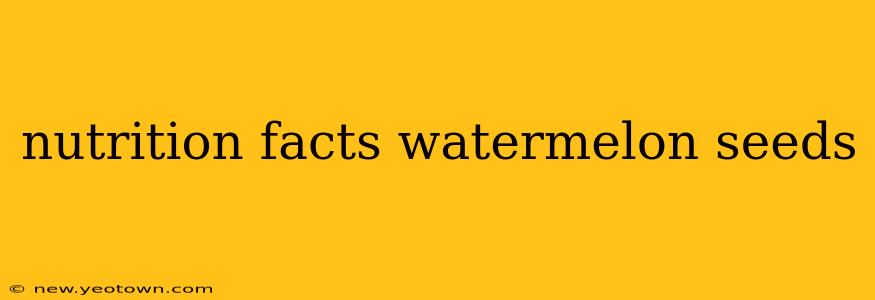Watermelon, the quintessential summer treat, is often enjoyed for its juicy, refreshing flesh. But what about those tiny, often discarded, black seeds nestled within? They’re not just a nuisance; they’re a nutritional powerhouse packed with essential nutrients often overlooked. Let’s delve into the surprising world of watermelon seed nutrition.
My name is Alex, and I've been researching the nutritional benefits of often-overlooked foods for over five years. I'm passionate about helping people discover the hidden health benefits in everyday ingredients.
Imagine this: you’re enjoying a perfectly ripe watermelon on a hot summer afternoon. You savor the sweet, juicy flesh, but then you instinctively spit out the seeds. What if I told you those tiny seeds hold a wealth of nutrients that can benefit your health? Let's explore the fascinating nutritional profile of watermelon seeds.
What are the Nutritional Benefits of Watermelon Seeds?
Watermelon seeds are a surprisingly rich source of several essential nutrients. They’re packed with healthy fats, protein, fiber, and various vitamins and minerals. These tiny powerhouses contribute to overall health and well-being in several ways. They are a good source of:
- Healthy Fats: Rich in monounsaturated and polyunsaturated fatty acids, which are crucial for heart health and brain function.
- Protein: A good source of plant-based protein, contributing to muscle growth and repair.
- Fiber: Promotes digestive health and helps regulate blood sugar levels.
- Magnesium: Essential for muscle and nerve function, blood sugar control, and blood pressure regulation.
- Iron: Plays a vital role in oxygen transport throughout the body.
- Zinc: Supports immune function and wound healing.
- Manganese: Important for bone health and metabolism.
Are Watermelon Seeds Good for You?
Absolutely! The nutritional benefits of watermelon seeds are undeniable. Incorporating them into your diet can offer numerous health advantages. They contribute to:
- Improved Heart Health: The healthy fats and magnesium content help maintain healthy cholesterol levels and blood pressure.
- Boosted Immunity: The zinc and other nutrients support a robust immune system.
- Better Digestion: The fiber content aids in digestion and prevents constipation.
- Increased Energy Levels: The combination of healthy fats, protein, and carbohydrates provides sustained energy.
- Improved Skin Health: Some studies suggest that the nutrients in watermelon seeds may contribute to healthier skin.
What are the Potential Side Effects of Eating Watermelon Seeds?
While generally safe, consuming large quantities of watermelon seeds might lead to some minor digestive discomfort, such as bloating or gas, due to their fiber content. However, these side effects are usually temporary and resolve quickly. Moderation is key, as with any food.
How Many Watermelon Seeds Should I Eat Per Day?
There's no strict daily recommendation, but a small handful (about 1-2 tablespoons) is a perfectly reasonable amount to incorporate into your diet. Remember, moderation is key.
Can You Eat Watermelon Seeds Raw?
Yes! You can eat watermelon seeds raw, roasted, or sprouted. Roasting enhances their flavor and makes them crispier, while sprouting increases their nutrient content.
How Do You Prepare Watermelon Seeds?
Preparing watermelon seeds is simple. You can either eat them raw, after cleaning them thoroughly, or roast them for a delicious and crunchy snack. Simply rinse the seeds, spread them on a baking sheet, and roast them at a moderate temperature until they're slightly browned and crispy.
What are the Health Benefits of Roasted Watermelon Seeds?
Roasting watermelon seeds intensifies their flavor and makes them more palatable for some people. The roasting process doesn't significantly diminish their nutritional value.
In conclusion, those tiny watermelon seeds you often discard are a nutritional treasure trove waiting to be discovered. Incorporating them into your diet can contribute to better health and well-being. So next time you enjoy a juicy watermelon, remember to appreciate the nutritional power packed within those little black seeds!

